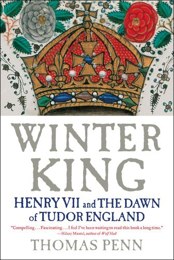Winter King
by Thomas Penn
Henry VII barely won his throne, beating Richard III by the narrowest of margins after a life chiefly on the run. He was determined that no man would repeat his accomplishment, and he was anxious never to lack money again, and in the process of securing these goals he established the Tudor dynasty and stabilized England after a century of tumult. Richard III had been a knight of the late middle ages who died calling for a fresh charger, but Henry Tudor was an early modern bureaucrat who meticulously reviewed every account and checked every detail. On the road, after Prince Henry managed to mislay a gold chain, the royal jewel-house keeper noted grimly, that “the king knoweth of it.”
That nobody especially liked him, save for what he could give, seems not to have bothered the king. Or perhaps it did: in later years, his progresses were interrupted by frequent breaks for solitary time spent alone or, at any rate, out of the spotlight. He did his best to govern without Parliament, and largely succeeded. He paid close attention to security, and in the end his closest relationships were with his security detail.
This biography of Henry VII has been widely praised everywhere, from The Guardian (which you would expect) to the Wall Street Journal (which you would not). It’s a very fine book, and will become the definitive biography of this important and neglected era. It is is not, to be honest, very much fun, but neither was Henry.
